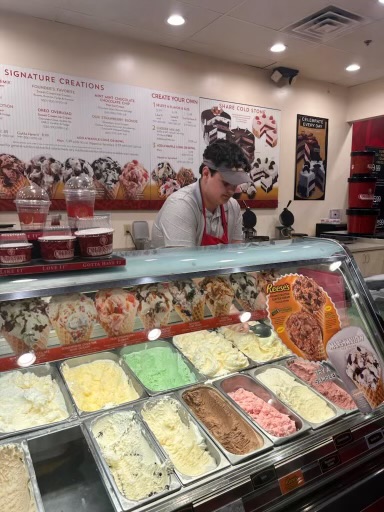Work and school: a battle for students’ attention

OHS student works hard at their job.
May 16, 2023
The season for first jobs and salvaging bank accounts is upon, making students at OHS have to balance their work and school life. More working students means more teenagers coming to the harsh reality of subjective hiring, demanding hours, and draining schedules.
People get their first job for many different reasons: from saving up for a car, to rescuing their struggling bank accounts, to even just trying to fill up their free time.
“I was bored at the time, because it was the end of summer, and I didn’t have much to do, and I knew I needed a job for paying for gas and other expenses later,” said Carsyn Jensen, junior.
Trying to find a job in itself is a demanding task, students repeatedly are at a disadvantage within the workplace. Despite countless ‘Now Hiring’ signs floating from shop to shop, teenagers are lucky to even hear back from prospective employers, presumptive prejudice already being placed against them.
“You don’t really have as much work experience, [so] not many places will hire you at first,” Jensen said.
Once a job is finally secured, many students find it is much more demanding than anticipated; the standard for student hires is high, inducing pressure, and even impeding their life outside of work.
“A lot of managers don’t really think about it because they’re out of school, so they don’t realize ‘Oh everyone else has something outside of this’, because that’s like their whole life,” Jensen said.
From late-night closing shifts, to strenuous hours, teenagers who are new to the workplace can be easily taken advantage of, and misused for their willingness to learn. The dynamic between the employer and the employee is a fine line of equality and abusive power.
“A lot of these employers, they don’t really look at your best interests like that, so just make sure you find the right one for you; you got to make sure you trust [the employer] in a job interview,” said Alex Salazar, senior.
Regardless of the employer, sometimes it is impossible to escape the looming closing shift, forcing students limited time to prepare for school, and cutting down any chance of being well-rested for the following school day.
“I think it definitely takes up a lot of my time, especially because I’m a closer, so when I have a closing shift, I can’t really study for something the next day, like I’ll take time from talon time or something to do it instead,” Jensen said.
Talon time has a whole new meaning to those with jobs, whose free time is something so desperately rare and precious. Those extra 42 minutes twice a week are a saving grace in the busy schedules of working students desperate for ways to manage their different forms of work.
“You fake it until you make it, that’s what you do; I try to use a lot of my free time to do any work I would have to do at home, or sometimes I do it at work on my break time,” said Jada Pruitt, sophomore.
Adjusting to constant ‘to-do’ lists, eye bags, and hours of post-shift homework can be an unattractive lifestyle, but ultimately the effort of balancing both a job and one’s grades does not go unrewarded.
“You just learn how to better do time management. Make sure you’re well rounded enough to appropriate your attention [to] each field whether it be school or work,” Salazar said.
Being a student employee does not just increase the money in your bank account, but it also leaves you with skills you would have never had if not for the experience early on in your life.
“It teaches you to get along with people you really don’t like, and how to maintain an attitude inside and outside of school, because work is a different environment but you’re still working with a lot of other people,” Salazar said.
Work and school create a linear relationship, a tug of war between love and hate, and high schoolers unfortunately often get caught in the cross hairs.
“I have definitely learned a lot of time management, more responsibilities, and just the difficulties of managing school and work; it’s a lot,” Jensen said.
While holding school work to a higher importance should be every student’s priority, there is no doubt that work experience as a teenager is a kickstart to certain life lessons and character traits: tenacity, responsibility, and a well-rounded work ethic.
“I personally think there’s more benefits just because you’re going to have more of an understanding after school, like how to get a job, and where you want to work, or how to be financially responsible,” Jensen said.


